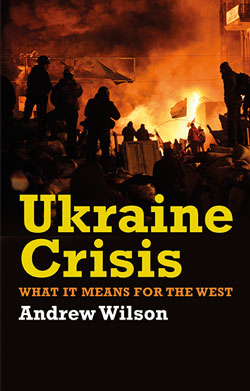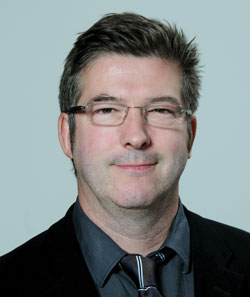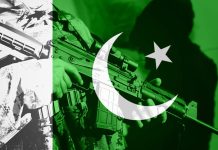Andrew Wilson discusses his latest book: Ukraine Crisis: What it means for the West. He contends that the book is actually about three inter-related crises, the Russian crisis, the EU crisis and the Ukraine crisis and how crisis in each of these regions has continued to fuel the Ukraine crisis.
The Russia Crisis
The first thing to say about my book is that “Ukraine Crisis” was the publishers’ choice of title. Though they were right: a long-winded alternative title like “The General European Crisis after the Collapse of the post-Cold War Order” was never going to sell many books.
The book is actually about three inter-related crises. And I would put the “Russia Crisis” first. The war with Ukraine has shown just how many apologisers for Russia there are in the West. And not just the corrupt and the stupid; academic and foreign policy establishments are dominated by what are known in German as “Russia-Understanders” (Russland-versteher). But the one thing “Russia Understanders” don’t do is understand. They simply relay Kremlin propaganda as fact, because “we must understand” the Russians’ position or “feel their pain”. But most of the standard lines we read and hear so often – Russia was “humiliated” after 1991, the West has excluded Russia from the world order since the end of the Cold War, the West broke promises not to expand NATO – are not given truths, but the products of Russia’s propaganda state.
Russia is run by some nasty and cynical people. Not just because they are brutal and corrupt. They have developed what is known locally as “political technology”, a hybrid marriage of Soviet agit-prop and the idea of the “society of the spectacle” in Western post-modern philosophy. Even back in the 1990s, Russia developed a form of “virtual politics”, in which all players and themes in the political process were manipulated via media control. This is now so ingrained that there is supply as well as demand. The “Russian nationalists” in Crimea and the “volunteers” in the Donbas sold themselves to the Kremlin as much as they were created by the Kremlin. It is therefore hard to read Russian policy, but not just because so few people make the key decisions. It is hard to read Russian policy because its actions are both ultra-cynical, and the elite seems to have come to believe its own myths.
According to Sergei Naryshkin for example, the Chair of the Russian Duma, by condemning the 1945 Yalta Agreement, the West is “deleting from its own history and the history of world diplomacy one of its best and noblest moments”. Yalta kept the peace because of its “military realism” and created a “system of international relations that was more effective than the previous one” until “almost until the end of the 20th century” and prevented a Third World War.1
Which only shows again how different the Russians are. The implications of praising an Agreement with such a bad reputation in the West are startling.
The West After 2008
Even worse, the crisis has shown just how terrible the EU is at foreign policy. Russia has easily sown divisions among the 28 EU member states, and the new EU foreign service and “foreign minister” (High Representative) created by the 2007 Lisbon Treaty have been either inactive or naïve.
Germany, the EU’s dominant economic power, has been at the foreign policy helm by default during the crisis, with the UK excluded by its anti-European phobias and Hollande just a spectator to avoid the historically awkward impression of another Russian-German carve-up of Europe. Merkel has actually come a long way on a personal level, shedding illusions about the possibility of working with Russia after simply being lied to so often. But she has paid a price at home: her coalition partner the SPD is losing votes to Die Linke on the Russia issue, German business is still pushing for “normalisation”, and peace rallies and anti-Americanism fired by eavesdropping scandals have created the movement PEGADA (PEGIDA was the “Patriotic Europeans Against the Islamisation of the West”; now it is joined by “Patriotic Europeans Against the Americanisation of the West”). And Germany just doesn’t do hard power. Its deep-rooted pacifism has obvious historical roots, but is not the best way to oppose such an openly aggressive power as Putin’s Russia. The EU has been simply gamed by Russia in peace negotiations, when a frankly desperate desire for peace at all costs has dragged Ukraine into a series of bad deals.
In fact we may even see an anti-European backlash in Ukraine – and not just in Ukraine. A year ago, the demonstrations that led to the flight of President Yanukovych were known as the “Euromaidan”, but if Ukraine is now being torn apart for attempting to be Europe’s friend, then it may become resentful and isolated, if not necessarily swing back towards Russia. And why would the rest of the world want to do what Europe asks? Other non-democracies have taken careful note of Russia’s humiliation of EU leaders. Countries like China have copied Russia’s tactics in the South China Sea, hiding behind “proxy” to make bolder challenges to the international “order” than they would have deemed prudent only a year ago.
NATO, on the other hand, must show it can defend its member states, or its raison d’être will collapse. For the USA, the crisis is a key test of the possibilities and limits of retrenchment. Obama came to power to wind down the Bush Wars and prioritise diminished resources. But his first-term achievements have overshadowed his second. Obama may not want to tarnish his early gains by starting another war, but that inevitably means that problems accumulate. And there is little point in withdrawing attention from problem regions if others fail to take over – which is what the US reasonably expected the EU to do in countries like Ukraine – and Washington has to re-commit to an even greater mess.
But readers may guess I am not a fan of the kind of “it’s-all-our-fault-ism” in the West that blames the current crisis on ourselves; as with the left’s favourite theory of NATO expansion “provoking” Russia, or the right’s favourite theory that the “imperial” EU had no business poking around in Ukraine in the first place. Only Russia is to blame for ignoring its treaty commitments and annexing part of a neighbouring state – and for not stopping there, but dong everything that it possibly can to undermine post-Yanukovych Ukraine.
Project Ukraine
So the “Ukraine Crisis” is actually only the third part of a book that bears that title. But “Ukraine Crisis” does not mean that this is all Ukraine’s fault, for being invaded. I do not buy the thesis that Project Ukraine was flawed from the very moment of independence in 1991. In fact, the basis of this whole crisis is Putin’s determination to prove the unprovable, namely his oft-repeated assertion that Ukraine is not a real country and therefore can only be a dysfunctional state. Ukraine has always been fragile round the edges, but is not split down the middle, as it so often claimed.
Ukraine’s problems are indeed massive, but they are mostly political. It has the worst governing class in Europe. Ukraine’s anti-communist dissident movement was too small to take power in 1991, so the country has been run by default by corrupt and unimaginative former Soviet bureaucrats. Ukraine does not have the oil and gas that Russia has, but it has an elite that would like to be just as rich as their Russian counterparts. Under President Yanukovych, they simply plundered the state budget and drove the economy into the ground.
They stayed in power by using ultra-cynical “political technology”. Ever since the last uprising in Ukraine, the so-called “Orange Revolution” in 2004, elections have been fought using a smokescreen of identity politics – it was Yanukovych’s team who invented many of the Russian propaganda myths about the “fascist threat” in Ukraine.
But the artificiality of the current crisis needs to be emphasised. How could it be otherwise when the rag-tag militias in the Donbas region a year ago now have a possible 500 tanks, twice as many as the British Army? The fact that the West still often havers about whether Russia is “directly” involved is depressing beyond belief.
So a lot of Ukrainians don’t like being labelled with the term “Ukraine Crisis”. The crisis is not primarily their fault. It’s not just about Ukraine. And the Uprising that overthrew Yanukovych in February 2014 was supposed to change Ukraine for the better.
To finish on a personal note, I was in Kyiv last February. I kept my promise to my wife to stay clear of the worst of the violence, but I saw a lot of what I now know to be fatal injuries. I also saw a great civic uprising, a nineteenth century style revolt involving thousands of ordinary Ukrainians. Here is one. The picture (see above) was taken on the morning of 20 February, when snipers killed seventy protestors in Kyiv’s main square. The two guys with the kettle drum were beating out a march. The guy on the right is looking forlornly back, about five metres from the main square, the “Maidan”. Contrary to Russian myths about a “coup d’état”, his “weapon” is a stick. I still hope that the protestors will succeed in changing Ukraine, and Europe, despite Russia’s determination that they should fail.
 Andrew Wilson’s book Ukraine Crisis: What the West Needs to Know was published by Yale in October 2014 in the UK (http://yalebooks.co.uk/display.asp?K=9780300211597).
Andrew Wilson’s book Ukraine Crisis: What the West Needs to Know was published by Yale in October 2014 in the UK (http://yalebooks.co.uk/display.asp?K=9780300211597).
Feature Image: Russian occupying powers unveil a statue to the Yalta “big three”, Churchill, Roosevelt and Stalin, in February 2015. The work by Zurab Tsereteli was ready years ago, but Ukraine took the “European View” of the Yalta Agreement, and the Crimean Tatars are vehemently hostile to Stalin, after their deportation in 1944
About the Author
 Andrew Wilson is Reader in Ukrainian Studies at University College London and a Senior Policy Fellow at the European Council on Foreign Relations. His book Ukraine Crisis: What the West Needs to Know was published by Yale in 2014. He has worked extensively on the comparative politics of the post-Soviet states since 1990. His other books include Belarus: The Last European Dictatorship (2011), The Ukrainians: Unexpected Nation (third edition, 2009), Ukraine’s Orange Revolution (2005) and Virtual Politics: Faking Democracy in the Post-Soviet World (2005).
Andrew Wilson is Reader in Ukrainian Studies at University College London and a Senior Policy Fellow at the European Council on Foreign Relations. His book Ukraine Crisis: What the West Needs to Know was published by Yale in 2014. He has worked extensively on the comparative politics of the post-Soviet states since 1990. His other books include Belarus: The Last European Dictatorship (2011), The Ukrainians: Unexpected Nation (third edition, 2009), Ukraine’s Orange Revolution (2005) and Virtual Politics: Faking Democracy in the Post-Soviet World (2005).
Reference
1. Vitaliy Petrov, “Naryshkin accused the West of flirting with pro-Nazi forces”, Rossiiskaia gazeta , 25 February 2015; www.rg.ru/2015/02/25/zaigryvanie-site.html.


































































